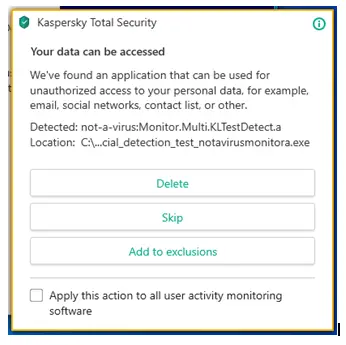PHOTO
Kaspersky has enhanced the protection of users’ personal information on PCs by introducing several new features to its consumer products and developing Kaspersky Security Cloud to adapt to its users’ needs. Its Account Check feature now automatically checks if email addresses that customers use when logging into their online accounts have been compromised. Additionally, Kaspersky Anti-Virus, Kaspersky Internet Security, and Kaspersky Total Security are now equipped with the advanced ability to detect stalkerware - a commercially available software used to spy remotely on a PC user. Furthermore, Kaspersky Password Manager can now be installed with Kaspersky’s Anti-Virus, Internet Security, Total Security, and Security Cloud products to keep user credentials organized and under control.
According to a recent Kaspersky report - Defending digital privacy: taking personal protection to the next level - a third (30%) of consumers in the United Arab Emirates have faced incidents where their private information was accessed by someone who did not have their consent. These stats highlight the need to keep and store personal information more securely and therefore having the right attitude towards how personal data is protected.
Moreover, the problem of protecting privacy is further aggravated by the existence of stalkerware, special software that uses hidden functions that are quite difficult to identify. One example of this type of software is designed to secretly run on a victim’s device. As stalkerware is designed to harvest all kinds of data, no matter what type of device a victim of stalker is using, it isn’t just a problem for mobile devices, but PC users as well. In fact, the number of users that encountered stalkerware on a PC grew by 35% to reach over 37,000 in 2019, while spyware tools accounted for 26,620 of those targeted.
To strengthen privacy on personal computers, Kaspersky has introduced several new features for PC users in its consumer products. In particular, Kaspersky has enhanced the Account Check feature within Kaspersky Security Cloud for Windows. The feature now auto-checks email addresses entered when logging into online accounts. This means users can save time as they do not need to manually input the email addresses they want to be checked by the service. Plus, users now have the option to add individual email addresses to a list that is checked regularly by the feature.
As for the new generation of the company’s traditional consumer products, which include Kaspersky Anti-Virus, Kaspersky Internet Security and Kaspersky Total Security, Kaspersky has improved detection to eliminate intrusive technology, such as stalkerware[1], on PCs. The feature sends a notification to a user to warn them that stalkerware has been detected on their device and allows the user to either remove the identified software, ignore it or add it to their excluded list of trusted applications. This new feature for Windows supports last year’s release, when Kaspersky started to flag commercial spyware with a specific alert that warns users of the dangers stalkerware poses on Android devices.


Furthermore, to ensure credentials kept on Windows remain safe, a free edition of Kaspersky Password Manager now comes with Kaspersky Anti-Virus and Kaspersky Internet Security products. Users who purchase Kaspersky Security Cloud and Kaspersky Total Security will be able to install the premium version of Kaspersky Password Manager.
“Despite the popularity of mobile devices, we see a high demand among consumers to protect personal information they store on computers – so it is crucial to secure it properly. For this reason and in response to numerous requests from our users, we have added advanced detection of commercially available spyware – known as stalkerware – to PCs. Furthermore, the Account Check feature within Kaspersky Security Cloud on mobile devices has recently found 85% of users’ emails were in the public domain. This underlines the risks of private data being compromised online, so we have updated a feature on Windows to now automatically check if users’ email addresses could be used to access their accounts without their knowledge. We have also extended privacy protection within our basic products – Kaspersky Anti-Virus and Kaspersky Internet Security – with a free version of Kaspersky Password Manager, allowing everyone to secure up to 15 entries in an encrypted vault. While online activity brings new opportunities, we provide the services to ensure every detail that can be found in your personal information is safeguarded and our solutions prevent it from falling into the wrong hands,” comments Marina Titova, Head of Consumer Product Marketing at Kaspersky.
There are two editions of Kaspersky Security Cloud available for customers: Personal and Family. While the Personal edition provides protection modern users’ everyday needs, the Family edition adds a Parental Control feature and remote management tools to provide protection for the whole family.
More information about the updated version of Kaspersky Total Security can be found here.
To get more information about the new generation of Kaspersky’s consumer traditional product line, visit the official website here.
About Kaspersky
Kaspersky is a global cybersecurity company founded in 1997. Kaspersky’s deep threat intelligence and security expertise is constantly transforming into innovative security solutions and services to protect businesses, critical infrastructure, governments and consumers around the globe. The company’s comprehensive security portfolio includes leading endpoint protection and a number of specialized security solutions and services to fight sophisticated and evolving digital threats. Over 400 million users are protected by Kaspersky technologies and we help 250,000 corporate clients protect what matters most to them. Learn more at www.kaspersky.com.
[1]One of legal types of spyware used to spy on children, colleagues or relatives. Promoted as parental control tools, these apps, however, have a much broader scope of application. Stalkerware is installed without the device owner’s consent to secretly stream the victim’s personal info – images, videos, correspondence, and geolocation data – to a command server. This carries the danger of personal information being misused by third parties.
© Press Release 2020
Disclaimer: The contents of this press release was provided from an external third party provider. This website is not responsible for, and does not control, such external content. This content is provided on an “as is” and “as available” basis and has not been edited in any way. Neither this website nor our affiliates guarantee the accuracy of or endorse the views or opinions expressed in this press release.
The press release is provided for informational purposes only. The content does not provide tax, legal or investment advice or opinion regarding the suitability, value or profitability of any particular security, portfolio or investment strategy. Neither this website nor our affiliates shall be liable for any errors or inaccuracies in the content, or for any actions taken by you in reliance thereon. You expressly agree that your use of the information within this article is at your sole risk.
To the fullest extent permitted by applicable law, this website, its parent company, its subsidiaries, its affiliates and the respective shareholders, directors, officers, employees, agents, advertisers, content providers and licensors will not be liable (jointly or severally) to you for any direct, indirect, consequential, special, incidental, punitive or exemplary damages, including without limitation, lost profits, lost savings and lost revenues, whether in negligence, tort, contract or any other theory of liability, even if the parties have been advised of the possibility or could have foreseen any such damages.




















